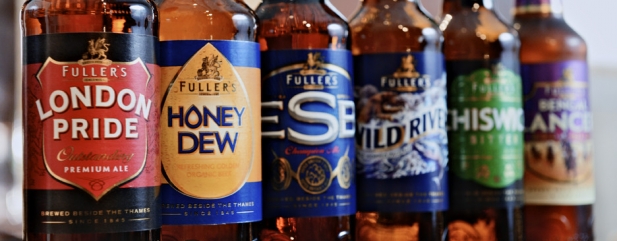Archived article
Please note that tax, investment, pension and ISA rules can change and the information and any views contained in this article may now be inaccurate.
Beer seller Fuller’s has no choice but to innovate

Many people associate innovation with using technology to develop new products and services. What’s often overlooked is the need for more traditional businesses to innovate in order to stay competitive and not necessarily rely on technology to achieve this goal.
There is a phrase in the world of business which says companies often thrive if they ‘stick to what they do best’. Yet this arguably fails to take into account the need for innovation. Sometimes companies have to change so their proposition is relevant in today’s market, even if their core products are already top notch.
The reason I’m discussing innovation this week is the result of a conversation with Simon Emeny, chief executive of pubs-to-beer seller Fuller, Smith & Turner (FSTA). The company’s latest full year results showed zero growth in total beer and cider sales volumes. That refers to products brewed by Fuller’s rather than all the beer and cider including third party products it sells in its pubs.
Fuller’s has a core portfolio of excellent beer including London Pride and ESB. Unfortunately for the company, drinkers today want to experiment by continuously trying new products, a trend spawned by the rise of craft beer and many micro-breweries in the UK and beyond. That means some of the classics like London Pride are getting side-lined (perhaps a temporary phenomenon?).
Emeny argues that Fuller’s ‘Managed Pubs and Hotels’ division accounts for 75% of group operating profit and so it isn’t disastrous that Fuller’s own-brewed products haven’t seen any sales volume growth. He says the important factor is for the pubs to be growing sales overall.
‘We stock products people want. But if you are a beer producer, there is no doubt we’re in a more competitive environment,’ says the CEO.
Fuller’s response to shifting customer habits has been to crank up product innovation – introduce more own-brewed beers to engage with customers. For example, new Fuller’s products using Australian and American hops now compete for pump space in its pubs alongside its classics.
But does it now offer too many products? Emeny doesn’t think so. In fact, he says ‘today’s customer wants variety and innovation’. That comes at a cost.
Fuller’s main brewery in Chiswick, West London, has a minimum run of 160 barrels per product which works out at just over 46,000 pints. That raises the risk of a lot of wastage if the new products are a flop with customers.
In response it is going to build a pilot brewery so that it can do shorter runs on new products, thereby enabling it to experiment more and reduce wastage. While that gives the company more flexibility, Emeny admits it will be harder to make money this way. ‘We simply have to stay innovating to compete,’ he concedes.
Fuller’s is a classic example of a company that has fine-tuned its business and got its core proposition spot on – the pubs are fitted out nicely, the food is great quality and its classic beer range is very tasty.
I do get the feeling that some of Fuller’s innovation is borne out of necessity rather than a desire to keep trying new things. However, the need to innovate also stops management becoming too complacent. It helps to challenge and to invigorate new ideas which ultimately keep the energy flowing around a business. (DC)
Important information:
These articles are provided by Shares magazine which is published by AJ Bell Media, a part of AJ Bell. Shares is not written by AJ Bell.
Shares is provided for your general information and use and is not a personal recommendation to invest. It is not intended to be relied upon by you in making or not making any investment decisions. The investments referred to in these articles will not be suitable for all investors. If in doubt please seek appropriate independent financial advice.
Investors acting on the information in these articles do so at their own risk and AJ Bell Media and its staff do not accept liability for losses suffered by investors as a result of their investment decisions.
Issue contents
Big News
- Sopheon soars past share price expectations
- Predator may be first of many to circle Inmarsat
- Windows upgrade boon for Computacenter
- This week’s most important macro stories
- Profit margin fears dog housebuilders
- Why Playtech’s acquisition of Snaitech is a potential game-changer
- Jurassic-sized expectations for Frontier Developments

 magazine
magazine








